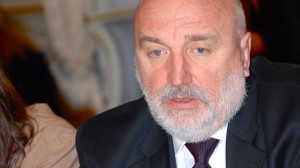
Godmanis' government fell in early 2009, the only casualty of the crisis in the Baltic states. The Estonian and Lithuania governments have survived thus far despite unpopular measures, but there is widespread speculation that Latvia's current government is on the precipice.
RIGA — Former Prime Minister Ivars Godmanis has said that he is against topping the current government so close to national elections, a position that puts him at odds with Ainārs Šlesers, co-chairman of the Latvia’s First/Latvia’s Way coalition party.
Godmanis, who resigned early last year after the People’s Party and the Greens and Farmers Union expressed a lack of confidence in his Cabinet, told Latvian Radio on Friday that he saw no need to change the government prior to the national elections in October.
His position is in stark contrast to that of Šlesers, who in December said the current government of Prime Minister Valdis Dombrovskis should be toppled in February and a new Cabinet formed.
Godmanis, who is now a member of the European Parliament, and Šlesers, Riga’s deputy mayor, have always been allies by political necessity and not common outlook.
Godmanis’ Latvia’s Way, which dominated Latvian politics throughout the 1990s and up to the elections in 2002, is generally libertarian, while Šlesers created Latvia’s First Party in 2002 with a platform mainly espousing Christian values.
The two parties, which merged on the eve of the 2006 elections, don’t see eye-to-eye, for instance, on sexual minorities’ rights.
With 10 seats in Parliament, Latvia’s First/Latvia’s Way is currently in the opposition, though in Godmanis’ words, it is part of the “constructive opposition.” Godmanis remains a strong defender of the €7.5 billion international bailout agreement that his government signed with the IMF, the EU, and other lenders in December 2008.
On Friday he said that if Dombrovskis’ government fell his party would propose candidates for ministerial positions and would only support those parties that promised to continue with the anti-crisis program approved by international lenders.












